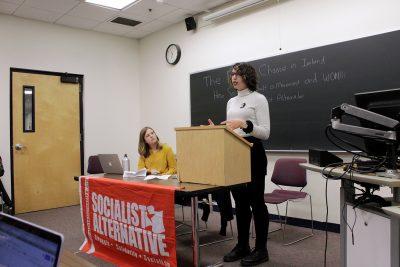
Thirty-one-year-old Savita Halappanavar was denied an abortion and contracted septicemia, an infection induced from a miscarriage, that eventually lead to her death in Ireland in 2012. Halappanavar’s death gave birth to an Irish socialist feminist movement that fought to ensure it would be neither in vain nor in multitude, movement representative Myriam Poizat said.
Addressing a 30-person audience at Northeastern University Friday, Poizat spoke about how the movement, also known as ROSA, transformed Ireland from a nation with a total ban on abortion to a nation with funded abortion services for pregnancies under 12 weeks.
The Boston branch of The Socialist Alternative, an international political party, invited Poizat to discuss ways to mirror the success of ROSA’s movement in the United States.
Boston was Poizat’s first stop on a speaking tour that includes cities such as Philadelphia, Pittsburgh and Columbus, Ohio. As a representative of both ROSA and the Socialist Party in Ireland, Poizat explained how class relations fit into the fight for reproductive health.
According to Poizat, solidarity and socialism are means to engage with the struggle for reproductive health in her home country of Ireland, where 3,000 women traveled abroad to the United Kingdom, seeking abortions in 2018.
Ireland’s Eighth Amendment, which was adopted in 1983, “granted an equal right to life to the mother and the unborn child,” which effectively banned abortion in the country, according to a BBC article. In May 2018, the amendment was repealed in a national referendum.
The repeal of the ban, Poizat said, was a victory against the Catholic Church.
“A movement of the people brought forth radical change through mobilization,” she said.
Poizat said that before the ban was successfully repealed, the women who went to neighboring countries such as the U.K. for abortions were women of means. Going abroad is expensive in itself, she said, and then there are additional fees for a procedure or a pill, an overnight hotel stay and other amenities.
She said working-class women did not have access to safe abortions if none were afforded to them by their country.
Sam Rodriguez, a law student who spoke along with Poizat, said she worked as part of a campaign called Together for Yes. TFY is the Irish social campaign that worked toward the repeal of the Eighth Amendment.
Rodriguez said she helped facilitate “pill busses” that drove abortion pills from the U.K. to Ireland. Prior to the repeal of the Eighth Amendment, she explained, five women a day would take abortion pills, which were accessed illegally.
The pill busses sought to expand safe and legal access to abortion, Rodriguez said.
“We’re told we have to be slow and gradual, but being a socialist means you don’t think about what the capitalist state says,” she said. “You can accomplish more when you demand more.”
Rodriguez said she believes that being a socialist is advantageous in a social justice campaign.
Quinn Angelou-Lysaker, a sophomore in the College of Arts and Sciences and member of The Socialist Alternative, helped organize Friday’s event. She said that capitalism relies on sexism and disadvantages women the most.
“Socialist feminism seeks to pull sexism out by its roots through a socialist transformation of society,” she said. “Liberal corporate feminism wants leadership from female politicians. Socialist feminism wants leadership from students, unions and grassroots women’s organizations.”























































































































